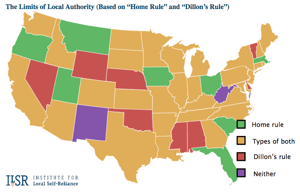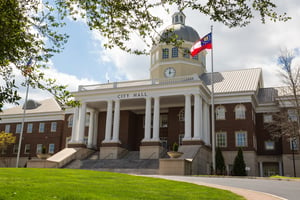Cities are fighting back against preemption to chart their own course on issues from labor standards to civil rights to environmental protection.
In August I attended the Mayors Innovation Project summer meeting in Grand Rapids where one of the most common themes in presentations and casual conversations was "preemption." So we reached out to Kim Haddow with the Local Solutions Support Center to find out more about preemption, why it has so many communities worried, and what they are doing about it.
Here is our Q&A on preemption:
Kim Lundgren Associates (KLA): In simple terms, what is preemption and what does that look like on the ground for local governments?
 Kim Haddow, Local Solutions Support Center (KH): Preemption is the use of state law to forbid or limit local governments from enacting or enforcing legislation. The current form of state interference now being used widely robs cities, towns and counties of their authority to make their own laws or decisions.
Kim Haddow, Local Solutions Support Center (KH): Preemption is the use of state law to forbid or limit local governments from enacting or enforcing legislation. The current form of state interference now being used widely robs cities, towns and counties of their authority to make their own laws or decisions.
Preemption is a tool, like the filibuster, that can and has been used by both political parties. In the past, preemption was used to nullify local measures inconsistent with state law. Preemption has also been used to advance well-being and equity. The federal Civil Rights Act of 1964, for example, allowed states and cities to increase protections, but prohibited them from falling below what was required under federal law. But, the present increased abuse of preemption is unprecedented and threatens the fundamental ability of cities to act on the unique views, values and needs of their communities.
The federal government also uses preemption to stop the states from enacting or enforcing their own laws. For example, the Federal Communications Commission has just preempted the states from creating or enforcing net neutrality laws. This has set up a court fight between the federal government and the state of California which just passed its own law to guarantee equal access to the internet for all users.
KLA: What are the types of local government policies that are being targeted and stymied by preemption and what could that mean for communities?
KH: The efforts to consolidate power at the state level and end local authority over a wide range of issues are part of a national long-term strategy – driven by corporate interests and very often orchestrated by the American Legislative Exchange Council (ALEC), an industry-funded organization of state lawmakers and lobbyists. Their strategy has succeeded at an alarming rate. Since 2011, with the advent of single party dominance in state houses across the country, the quantity of these “new” preemption laws has skyrocketed:
- 25 states now preempt local minimum wage laws
- 22 states now ban local paid sick days
- 41 states now prohibit local regulation of ride-sharing companies
- 43 states limit local authority to regulate guns or ammunition
- 20 states have banned local control over 5G technology
- 10 states have prohibited local plastic bag bans
- 3 states now ban soda taxes (Arizona, California, Michigan)
The state is now interfering in more policy areas:
- Labor standards (minimum wage, paid sick time, wage theft, local hire, pensions, fair scheduling)
- Civil rights (anti-discrimination, sanctuary cities, immigration)
- Public health and safety laws (gun safety, e-cigarettes sales, food labeling, sugar-sweetened beverages)
- Technology (broadband, 5G, self-driving vehicles)
- Environmental protection (factory farming, plastic bags, Styrofoam, energy benchmarking)
- Local zoning (fracking, inclusionary zoning, rent control)
- Local taxes (tax and expenditure limitations)
In addition, preemption is now being used to punish cities by cutting off state funds, fine or fire elected local officials, overturn ballot elections, and perpetuate racial, gender and economic inequity.
This increase in state interference in local lawmaking means cities are losing their authority to act on the needs views and values of their communities -- at a time when more people are looking to local government to take the lead in tackling public health challenges, enacting minimum wage and paid sick leave policies, expanding the boundaries of civil rights, responding to emerging environmental threats, and advancing other important reforms.
KLA: There are Home Rule states like my state of Massachusetts where, for example, a city can pass a plastic bag ban on its own. And there are Dillon's Rule states where a city would need specific legal authority from the state to pass such a ban. How is preemption playing out in both Home Rule and Dillon's Rule states and what areas are facing the biggest challenges?
KH: Home rule authority varies state by state and that home rule encompasses two  different issues: (1) the threshold authority for municipalities to enact legislation and (2) the ability of the state to preempt local laws. That is, most (but not all) states guarantee in their constitutions a local right to legislate (these are the Home Rule states), but at the same time, most of those Home Rule states still allow the state legislature to preempt local regulations (if they do so explicitly/uniformly/otherwise in accordance with the state constitution/laws/federal constitution).
different issues: (1) the threshold authority for municipalities to enact legislation and (2) the ability of the state to preempt local laws. That is, most (but not all) states guarantee in their constitutions a local right to legislate (these are the Home Rule states), but at the same time, most of those Home Rule states still allow the state legislature to preempt local regulations (if they do so explicitly/uniformly/otherwise in accordance with the state constitution/laws/federal constitution).
In places like Virginia, a Dillon's Rule state, there's no threshold authority to legislate, so cities can't even try to enact policies that would help their communities. This could be turned around by a state legislature interested in granting that baseline authority to municipalities.
On the other hand, when a state already guarantees a city the authority to enact its own legislation (i.e. in a home rule state), what it comes down to is the state legislature's willingness to use its preemption power to overturn those local laws. To use Texas and Massachusetts as examples, both grant cities the threshold authority to enact plastic bag bans, since they're home rule states. But Texas is much more willing to pass laws preempting that authority, whereas the MA legislature is willing to let those laws stand. So it's not really a question of whether TX or MA are allowed to preempt on the issue, but whether politically they want to interfere with local issues.
KLA: Preemption can have a huge impact on local communities' efforts to be become more welcoming, healthier, sustainable places to live and can blunt economic development and innovation. So what can local governments do in the face of these threats?
 KH: Local governments are fighting back.
KH: Local governments are fighting back.
States are being challenged in court: 20 cities in Florida are challenging the preemptive provisions of the state’s law banning localities from regulating guns; the City of Cleveland is fighting the State of Ohio’s preemption of its local hire law; Birmingham, Alabama, has made progress in its challenge of the State’s preemption of its local minimum wage law.
Cross-issue coalitions have beat back preemption bills in Minnesota (paid sick days and minimum wage), Florida (sanctuary cities), and West Virginia (wage and benefit laws.) Grassroots groups across Pennsylvania are fighting HB 861 right now – a bill that would preempt 40 wage and benefits laws, including local non-discrimination ordinances and Philadelphia’s paid sick days law, which has been in effect since 2015 and has helped more than 200,000 people.
Repeal efforts have begun. A bill to repeal Colorado’s minimum wage preemption bill passed through the state house in spring 2018. Depending on the outcome of the elections, the bill could also clear the state senate next session and become law. More repeal campaigns are being prepared for 2019.
Increasing ballot measures are being used to end-around preemption laws. In 2016, four states approved minimum wage ballot initiatives (WA, AZ, ME, CO); and two of those states (AZ and WA) also approved paid sick days ballot measures.
Finally, cities are organizing through groups like the Local Solutions Support Center and our partners at the National League of Cities, Local Progress and the State Innovations Exchange (SiX).
 KLA: Aside from individual defenses of local control, what do you see on the horizon for preemption?
KLA: Aside from individual defenses of local control, what do you see on the horizon for preemption?
KH: I do think we will see more state interference in the short term. Much of the impetus for this increase in the use of preemption since 2011 has stemmed from an anti-regulatory agenda driven by conservatives and the industry groups behind ALEC -- which writes and distributes model preemption bills to state legislators around the country. In the words of Texas Governor Greg Abbott, the aim is to “reduce, restrict and prohibit local regulation.”
The good news is more mayors and city councils and county commissions are willing to fight back – and there are more tools and resources available to them now. Cross issue advocates have prepared offensive strategies – including repeal campaigns, bills to strengthen home rule and to broaden speech and debate immunity to municipal officials, and grassroot campaigns to make clear the threat preemption poses to racial, gender and economic equity. More funders and advocates now recognize preemption as a roadblock to progress and a threat to democracy, and are preparing to go on the offensive in 2019.
------
Thanks to Kim Haddow and the Local Solutions Support Center for their perspective and resources on the topic of preemption -- one small word that can be hard to wrap our heads around but could have huge impacts on our ability to advance sustainable, equitable communities.


